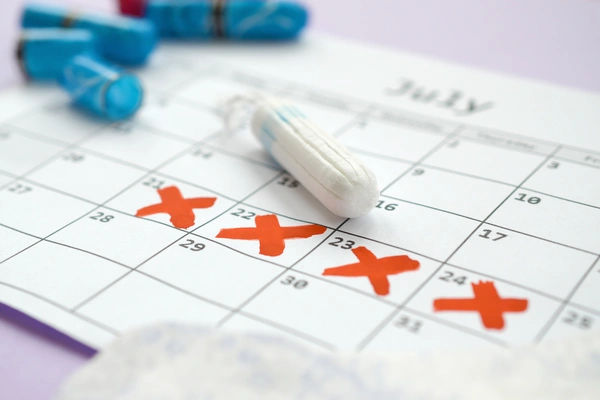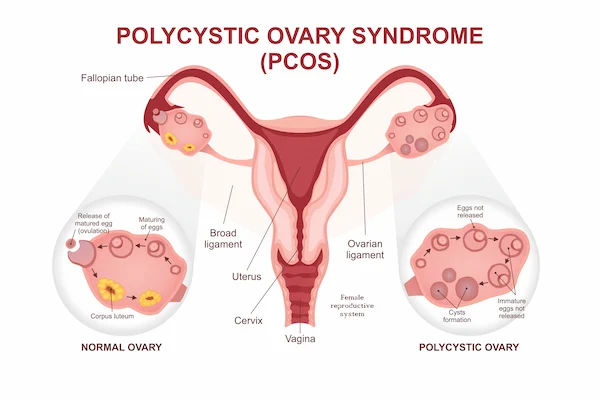What Leads To Signs Of Delayed Periods Diagnosis Treatment
Worried about a late period? Learn about the common causes of delayed periods, how a diagnosis is made, and the available treatment options. Find out when to see a doctor and what to expect.

Written by
Last updated on 13th Jan, 2026

Introduction
A delayed period can be a source of significant anxiety. While pregnancy is often the first thought, the reality is that your menstrual cycle is a finely tuned barometer of your overall health, influenced by everything from stress to underlying medical conditions. A one-off delay is usually nothing to worry about, but consistent irregularity warrants attention. This comprehensive guide will walk you through the myriad reasons—from common lifestyle factors to specific health issues—that can lead to a delayed period diagnosis. We'll demystify the diagnostic process, explore effective treatment options, and help you understand when it's time to seek professional guidance to get your cycle back on a healthy track.
What Exactly is a Delayed Period?
A menstrual cycle is typically counted from the first day of one period to the first day of the next. The average cycle is 28 days, but anything between 21 and 35 days is generally considered normal. A period is usually deemed "delayed" if it's 5-7 days past your expected start date, especially if your cycles are usually regular.
The Difference Between a Late Period and Amenorrhea
It's important to distinguish between a simple delay and a more chronic condition. Amenorrhea is the medical term for the absence of menstruation. There are two types:
• Primary Amenorrhea: When a young woman has not had her first period by age 15.
• Secondary Amenorrhea: When a woman who previously had regular periods misses them for three or more cycles in a row.
While this article focuses on delays (often a symptom of secondary amenorrhea), the causes and diagnostic paths can be similar.
Top Causes of a Delayed Period
Understanding the "why" behind a late period is the first step toward addressing it. The causes can be broadly categorized into lifestyle and medical factors.Consult Top Specialists
Lifestyle and Environmental Factors
These are among the most common reasons for a temporary delay.
High Stress and Its Impact on Your Cycle
Chronic stress elevates cortisol levels, which can interfere with the hormones (GnRH) that trigger ovulation. This can pause ovulation, leading to a late period not pregnant. A study on students found that high perceived stress was significantly associated with menstrual irregularities.
Significant Weight Fluctuations and Diet
Both low body weight and rapid weight loss can shut down the reproductive system, as the body doesn't have enough energy to sustain ovulation. Conversely, obesity can lead to excess estrogen production, which also disrupts the cycle. Extreme dieting, eating disorders, and nutritional deficiencies are key contributors.
Strenuous Exercise and Athletic Training
Female athletes often experience athletic amenorrhea due to low body fat, high energy expenditure, and stress. The body prioritizes vital functions over reproduction.
Underlying Medical Conditions
When lifestyle factors are ruled out, these conditions are often investigated.
Polycystic Ovary Syndrome (PCOS)
PCOS and irregular periods go hand-in-hand. This common hormonal disorder is characterized by elevated androgen (male hormone) levels, which prevent ovulation and cause missed cycles.
Thyroid Disorders (Hyperthyroidism and Hypothyroidism)
The thyroid gland regulates metabolism. An overactive (hyperthyroidism) or underactive (hypothyroidism) thyroid can cause hormonal imbalance, directly impacting ovulation and menstrual regularity.
Other Hormonal Imbalances
High levels of prolactin (the milk-producing hormone), not related to breastfeeding, can suppress ovulation. Similarly, early menopause (premature ovarian insufficiency) and issues with the pituitary gland can be culprits.
How is the Cause of a Delayed Period Diagnosed?
If your period is consistently late, a structured diagnosis process is key. If your symptoms persist beyond two cycles, consult a doctor online with Apollo24|7 for further evaluation.
Step 1: The Medical History and Physical Exam
Your doctor will start by asking detailed questions about your cycle history, stress levels, diet, exercise routine, weight changes, and any medications. A physical exam, including a pelvic exam, may be conducted to check for any obvious abnormalities.
Step 2: Diagnostic Tests and What They Mean
To pinpoint the cause, several tests may be ordered. Apollo24|7 offers convenient home collection for tests like thyroid panels or HbA1c (important for PCOS diagnosis), making the process easier.
Pregnancy Test (hCG)
This is always the first and most crucial test to rule out pregnancy.
Blood Tests (Hormone Panels)
This is the core of the diagnosis. A doctor may check:
• FSH & LH: To assess ovarian function and check for PCOS or menopause.
• Thyroid-Stimulating Hormone (TSH): To rule out thyroid disorders.
• Prolactin: To see if high levels are suppressing ovulation.
• Testosterone & DHEA-S: Elevated levels are a hallmark of PCOS.
Pelvic Ultrasound
This imaging test allows the doctor to visualize the ovaries and uterus. It can identify cysts on the ovaries (a sign of PCOS), check the thickness of the uterine lining, and look for any other structural issues.
Treatment Options: Getting Your Cycle Back on Track
Treatment is not one-size-fits-all; it depends entirely on the underlying cause.
Lifestyle Modifications and Natural Remedies
For stress- or lifestyle-induced delays, this is the first line of defense:
• Stress Management: Incorporating yoga, meditation, or therapy can work wonders.
• Balanced Diet: Achieving and maintaining a healthy weight through nutritious food.
• Moderate Exercise: Scaling back on intense workouts if they are a contributing factor.
Medical Treatments Based on the Root Cause
Hormonal Therapy
Birth control pills or progesterone therapy can help regulate the menstrual cycle by providing the hormones your body may be lacking, inducing a regular bleed.
Medications for Specific Conditions
• PCOS: Metformin (improves insulin sensitivity) or Clomiphene (induces ovulation).
• Thyroid Issues: Medication to normalize thyroid hormone levels.
• High Prolactin: Drugs like cabergoline to lower prolactin levels.
If your condition does not improve after trying lifestyle methods, book a physical visit to a doctor with Apollo24|7 to discuss these medical options.
When Should You Definitely See a Doctor?
While an occasional delay is normal, you should consult a healthcare provider if:
1. You miss three or more periods in a row.
2. Your periods suddenly become irregular after being regular.
3. You have a period more often than every 21 days or less often than every 35 days.
4. You experience severe pain, unusually heavy bleeding, or fever.
5. You are under 16 and haven't started your periods.
Consult Top Specialists
Conclusion
A delayed period is more than just an inconvenience; it's a message from your body. While often triggered by manageable lifestyle factors, it can sometimes signal an underlying health condition that needs attention. By understanding the potential causes, from high stress to hormonal imbalance, you are better equipped to take proactive steps. Listen to your body, track your cycle, and don't hesitate to seek professional help for a proper diagnosis and treatment plan. Prioritizing your menstrual health is a vital part of your overall well-being. Take the first step today by consulting a healthcare expert to address any concerns you may have.
Consult Top Specialists

Dr. Chethan T L
General Physician/ Internal Medicine Specialist
5 Years • MBBS, MD, DNB (General Medicine)
Bengaluru
Apollo Medical Center, Marathahalli, Bengaluru

Dr. Rajib Ghose
General Physician/ Internal Medicine Specialist
25 Years • MBBS
East Midnapore
VIVEKANANDA SEBA SADAN, East Midnapore

Dr. Ramya Hari
General Practitioner
18 Years • Medical Head & Family Physician, DG Shipping Approved Doctor, Panel Physician - UK Visa Medicals
Chennai
Apollo Medical Centre Kotturpuram, Chennai

Dr. Waseem Ahmed
General Physician/ Internal Medicine Specialist
13 Years • MBBS, PG Dip. Geriatric Medicine, DNB Family Medicine, PG Dip. Endocrinology,Fellowship in Diabetes
Chennai
Apollo Speciality Hospitals OMR, Chennai

Dr. B Sivananda Reddy
General Physician
12 Years • D M ( OSMANIA MEDICAL COLLEGE, KNRUHS ) MD ( KASTURBA MEDICAL COLLEGE , MAHE) MBBS ( PESIMS&R, NTRUHS).
Secunderabad
Apollo Hospitals Secunderabad, Secunderabad
Consult Top Specialists

Dr. Chethan T L
General Physician/ Internal Medicine Specialist
5 Years • MBBS, MD, DNB (General Medicine)
Bengaluru
Apollo Medical Center, Marathahalli, Bengaluru

Dr. Rajib Ghose
General Physician/ Internal Medicine Specialist
25 Years • MBBS
East Midnapore
VIVEKANANDA SEBA SADAN, East Midnapore

Dr. Ramya Hari
General Practitioner
18 Years • Medical Head & Family Physician, DG Shipping Approved Doctor, Panel Physician - UK Visa Medicals
Chennai
Apollo Medical Centre Kotturpuram, Chennai

Dr. Waseem Ahmed
General Physician/ Internal Medicine Specialist
13 Years • MBBS, PG Dip. Geriatric Medicine, DNB Family Medicine, PG Dip. Endocrinology,Fellowship in Diabetes
Chennai
Apollo Speciality Hospitals OMR, Chennai

Dr. B Sivananda Reddy
General Physician
12 Years • D M ( OSMANIA MEDICAL COLLEGE, KNRUHS ) MD ( KASTURBA MEDICAL COLLEGE , MAHE) MBBS ( PESIMS&R, NTRUHS).
Secunderabad
Apollo Hospitals Secunderabad, Secunderabad
More articles from Menstrual Disorder
Frequently Asked Questions
1. How long can stress delay your period?
Significant stress can delay your period by a few days to several weeks. In cases of extreme chronic stress, it can even cause missed periods for months, as the body temporarily shuts down non-essential functions like reproduction.
2. What are the home remedies to get periods immediately?
While no remedy is guaranteed, some people find that relaxation techniques, applying mild heat to the abdomen, and consuming vitamin C-rich foods (like papaya, pineapple) or ginger tea can help stimulate uterine contractions and encourage flow. These are best for slight delays, not chronic issues.
3. Can a missed period with a negative pregnancy test mean PCOS?
Yes, absolutely. A missed period negative pregnancy test is a classic presentation of PCOS. Other symptoms include acne, excess hair growth, and weight gain. A doctor can perform specific blood tests and an ultrasound to confirm a PCOS diagnosis.
4. When is a delayed period a sign of early pregnancy?
A missed period is often the very first sign. If your period is more than a week late and you've been sexually active, take a pregnancy test. For the most accurate result, test first thing in the morning when urine is most concentrated.
5. How does thyroid disease affect the menstrual cycle?
Both an underactive (hypothyroidism) and overactive (hyperthyroidism) thyroid can cause irregular periods. Hypothyroidism often causes heavier, more frequent bleeding, while hyperthyroidism can lead to light, infrequent, or missed periods by disrupting the hormonal signals for ovulation.



